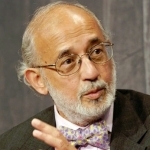 (Host) Commentator Sarwar Kashmeri is usually concerned with matters of
(Host) Commentator Sarwar Kashmeri is usually concerned with matters of
international business and national security, but when the citizens of
Norwich recently turned down a request from the town’s Police Department
to buy a computerized license plate reader – he took notice.
(Kashmeri)
Norwich isn’t the kind of haven for criminals or terrorists that would
justify the routine scanning of licenses. And as I thought about how the
unintended consequences might far outweigh the benefits, I was reminded
of the interview that took place during my application for United
States citizenship.
Everything was going smoothly until the
genial immigration official leaned back in his chair and said "Mr.
Kashmeri, I see you have said on your application that there are no
outstanding arrest warrants against your name."
"That is correct," I answered."
He
pulled a piece of paper from my folder and handed it to me. It was an
arrest warrant from the Saint Louis Police Department with my name on
it.
For a minute or so, though it seemed like an eternity, we
just sat there looking at each other. Neither of us said anything. We
didn’t need to. Both of us knew that making a false statement under oath
to obtain citizenship meant automatic dismissal of the application.
Then
it dawned on me: years ago I’d lived in Saint Louis and driven a rather
fast sports car that was a magnet for speeding tickets. When some of
them went unpaid, a bench warrant was issued for my arrest.
I
went to the local precinct, confessed all, paid the tickets, was given a
tongue lashing by the Sergeant and swore to behave myself. That was
decades ago and I’ve never received another citation for speeding.
But
the Police in Saint Louis are like those in any other jurisdiction.
Updating records in computer files ranks low in a usually overloaded
daily schedule. Obviously the Saint Louis police had not entered my
ticket payments into their computer – which would have cleared the
warrant.
I sheepishly explained all this to the emigration
officer. "But didn’t you help design that police computer system?" he
asked in a voice dripping with sarcasm.
Embarrassed, I then
admitted I was indeed one of the founders of the criminal justice
computer complex in Saint Louis. And I was well aware that one of the
things that makes these local law enforcement systems so effective is
they connect through the FBI’s computers in Washington DC to the police
computers of all 50 states – which brings me back to Norwich and those
license plate readers.
I happened to personally know the right
officials in Saint Louis and got myself out of the jam within hours. But
if a tourist from Nebraska were arrested in Norwich on an incorrect
arrest warrant that showed up on a license check, I suspect that tourist
might have a very uncomfortable few days.
And the problems
created by incomplete or erroneous records will only increase as it
becomes easier to collect personal information. That’s why citizens need
to continuously balance legitimate law enforcement needs with the risks
posed by information collection technology.
To their credit, the citizens of Norwich did this, and I think they got it right.